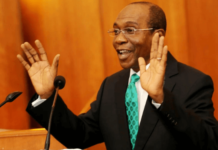
The Independent National Electoral Commission (INEC) has revealed that the 2015 general elections will stand as the costliest election to be conducted in Nigeria.
INEC said on Tuesday that the commission under its former chairman, Prof. Attahiru Jega, committed over $547 million (N107.759 billion at the exchange rate of N197/$) as core cost of the elections.
The commission also revealed that political parties and their candidates spent between $1.5 billion and $2 billion.
This revelation was made by the Chief Technical as frowned at what it described as an Adviser to the INEC Chairman, Prof. Bolade Eyinla, at the opening of a two-day learning conference on the Regional Cost of Politics, organized by the Westminster Foundation for Democracy in Abuja.
The INEC chairman’s aide, who argued that Nigerian politicians spend over $35 million to win election, regretted that while the electoral body and the Nigerian political parties commit more money in elections, the conduct of similar elections have continued to reduce in other West African countries such as Ghana and Benin Republic
He said: “In the last general elections in Benin Republic, the core cost was $15 million, but here, you had a candidate who, alone spent about $32 million.
“In Nigeria, our core cost was $547 million in the 2015 elections. It is perhaps the most expensive election that we have ever seen. I have seen figures somewhere of between $1.5 billion to $2 billion and believe me, it is true, if we really knew what happened. In one scandal, we heard of $115 million,” he said.
Eyinla also disclosed that 75 political associations have applied to INEC for registration as political parties, even as he noted that the existing laws do not give the commission the latitude to restrict the political space to fewer parties.
In her remarks, INEC National Commissioner, Prof. Anthonia Simbine, noted that “the level of money in politics is responsible for the kind of governance we have at any given time. If you make an investment, you would want to reap from that.”
On party financing, she said that the existing limits in the legal framework had become very unrealistic, because there are no enforcement framework or capacity. “This is more because our society is cash-based and so the capacity of INEC is still very weak in tracking and monitoring party financing,” Simbine said.
The Country Representative of the Westminster Foundation for Democracy, Mr. Adebowale Olorunmola, said that the cost of election in Nigeria in 2015 was higher than that of 2011.
“In 2011, all the opposition parties put together, spent N2.04 billion in traceable expenditure while the then ruling People’s Democratic Party (PDP) spent N5.01 billion. In 2015, all the opposition parties spent N2.91 billion while the PDP spent N8.74 billion,” he said.
Earlier, the Regional Director, Africa and Europe of the Westminster Foundation for Democracy, Mr. George Kunnath, urged countries in the region to examine the overall cost of politics, saying it has negative implications for the independence and performance of legislators.
Source: BreakingTimes




